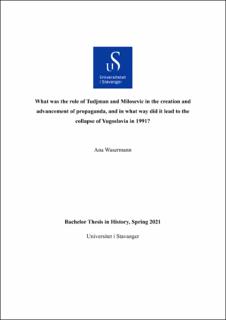| dc.contributor.advisor | Tyson Ashley Retz | |
| dc.contributor.author | Ana Wasermann | |
| dc.date.accessioned | 2021-09-03T16:34:29Z | |
| dc.date.available | 2021-09-03T16:34:29Z | |
| dc.date.issued | 2021 | |
| dc.identifier | no.uis:inspera:80601939:46872756 | |
| dc.identifier.uri | https://hdl.handle.net/11250/2773537 | |
| dc.description.abstract | Yugoslav wars that started in 1991 were the result of long term issues that have not been resolved by Josip Broz Tito and the Communist Party of Yugoslavia. The states and autonomies within the Federation of Yugoslavia wanted more economic and governmental independence, whilst seeking the recognition of their cultural and ethnic differences. With the right and clever political moves Slobodan Milosevic eventually became a president of Serbia in 1989. He was a staunch communist who understood the importance of having the support of nationalists, Yugoslav People’s Army and the Ortodox Church. Milosevic soon became the face of propaganda as well as the initiator. Similarly to Milosevic, Franjo Tudjman was a communist with a hint of patriotism at the start of his career, but then in the 1990s he changed his political direction once the Serbian nationalist propaganda started portraying Croats as the villains of Yugoslavia. Tudjman did not hold back, he joined efforts with emigrated Croats and used media to show the historical Croatian sovereignty and soften the views of Ustasha atrocities in the Second World War.
This study focuses on the political background and motives of Milosevic and Tudjman in order to fully understand who they are and what was their role in propaganda. The result of the study shows that neither Milosevic or Tudjman had nationalist inclinations before they became presidents. Nevertheless when they saw the power of nationalist propaganda, they knew pleasing people would keep them in power. They became the front face of propaganda and people believed that they were going to help get them out of the economic and ethnic crisis. There were a number of issues that led to the collapse of Yugoslavia, however in the 1990s they were all emphasised by propaganda, in which Milosevic and Tudjman had a crucial role. | |
| dc.description.abstract | Yugoslav wars that started in 1991 were the result of long term issues that have not been resolved by Josip Broz Tito and the Communist Party of Yugoslavia. The states and autonomies within the Federation of Yugoslavia wanted more economic and governmental independence, whilst seeking the recognition of their cultural and ethnic differences. With the right and clever political moves Slobodan Milosevic eventually became a president of Serbia in 1989. He was a staunch communist who understood the importance of having the support of nationalists, Yugoslav People’s Army and the Ortodox Church. Milosevic soon became the face of propaganda as well as the initiator. Similarly to Milosevic, Franjo Tudjman was a communist with a hint of patriotism at the start of his career, but then in the 1990s he changed his political direction once the Serbian nationalist propaganda started portraying Croats as the villains of Yugoslavia. Tudjman did not hold back, he joined efforts with emigrated Croats and used media to show the historical Croatian sovereignty and soften the views of Ustasha atrocities in the Second World War.
This study focuses on the political background and motives of Milosevic and Tudjman in order to fully understand who they are and what was their role in propaganda. The result of the study shows that neither Milosevic or Tudjman had nationalist inclinations before they became presidents. Nevertheless when they saw the power of nationalist propaganda, they knew pleasing people would keep them in power. They became the front face of propaganda and people believed that they were going to help get them out of the economic and ethnic crisis. There were a number of issues that led to the collapse of Yugoslavia, however in the 1990s they were all emphasised by propaganda, in which Milosevic and Tudjman had a crucial role. | |
| dc.language | eng | |
| dc.publisher | uis | |
| dc.title | What was the role of Tudjman and Milosevic in the creation and advancement of propaganda, and in what way did it lead to the collapse of Yugoslavia in 1991? | |
| dc.type | Bachelor thesis | |
